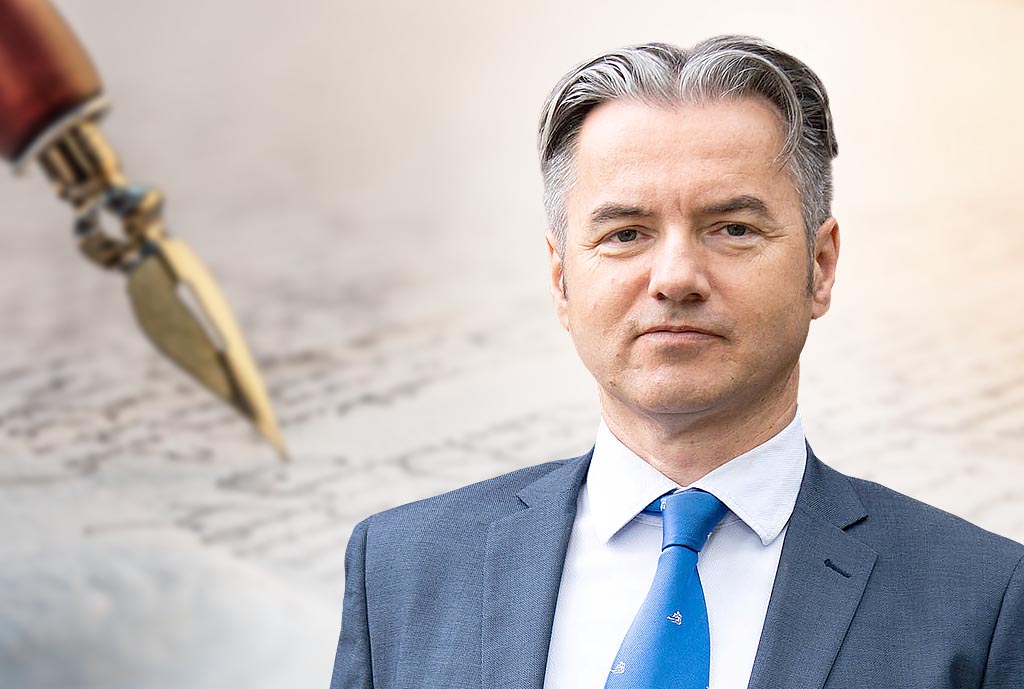By: Dr. Metod Berlec
The American journalist and war correspondent William Lawrence Shirer, in his most famous book The Rise and Fall of the Third Reich (1960), detailed the German judiciary of that time.
“Germany, under National Socialism, from the first weeks of 1933, when the authorities began mass arrests, beatings, and killings, lost a society based on law. The legal experts of Nazi Germany proudly proclaimed: ‘The law is Hitler!’ Göring reiterated this when he told the Prussian prosecutors on July 12th, 1934: ‘The law and the Führer’s will are one and the same’. This was true. The law was what the dictator said it was. In crucial moments, such as during the bloody purge, Hitler immediately after the bloodshed, in a speech before the Reichstag, declared himself the ‘supreme judge’ of the German people and, as such, had the right to condemn to death anyone he pleased.” The Commissioner for Justice and the Reich’s legal leader, Dr Hans Frank, also clearly stated to German jurists in 1936 on one occasion: “National Socialist ideology is the foundation for all fundamental laws; that is to say, especially the ideology explained in the party programme and the Führer’s speeches.” He further explained what he had in mind specifically: “The law is not independent of National Socialism. In every conclusion, ask yourself: ‘How would the Führer act in my place?’ In every decision, ask yourself: ‘Is this decision compatible with the National Socialist conscience of the German people?’ Then you will possess an iron framework that, combined with the unity of the National Socialist people’s state and your acknowledgment of the immortal will of Adolf Hitler, will forever imbue your area of decision-making with the authority of the Third Reich.”
Something similar began happening in our country during the Second World War. As Dr Damjan Hančič writes in the journal Dignitas (2012), resistance groups with different political and ideological beliefs, as well as different approaches to the fight against the occupiers, formed at the beginning of the resistance against the occupier. Among them, the Communist Party, which was the best organised and most ruthless in its methods of fighting the occupier and in not tolerating any resistance alternatives, took the leading role through the establishment of the OF and later directly subordinate armed groups and services. Under the guise of fighting the occupiers, they also carried out a communist revolution. This was achieved with the help of revolutionary repressive bodies (VOS, VDV, NZ, Ozna, and KNOJ) and partisan or revolutionary judiciary. These actions contradicted the fundamental principles of a modern legal state, which is based on the separation of legislative, executive, and judicial powers. Repressive bodies, which typically fall under the executive branch, were given excessive authority to decide on alleged criminal acts, which in a democratic legal state falls under the judiciary. The judiciary itself was exploited for political and ideological purposes. This continued after the so-called liberation in 1945. The Yugoslav communist regime, led by dictator Josip Broz Tito, shamelessly subordinated all branches of government, including the judiciary and law enforcement. Using these tools, they ruthlessly dealt with the so-called class enemy until the democratic changes in 1990/1991 and the collapse of the SFRY.
However, as the events following the democratisation and independence of the Republic of Slovenia in 1991 and during the transition years showed, the Slovenian judiciary, in particular, remained a captive of undemocratic practices from the past. It did not experience a democratic rupture like the legislative and executive branches. Due to the lack of lustration, it continued to be abused for the political needs of the transitional left. This was most evident in 2014 with the scandalous indictment and conviction of the opposition leader Janez Janša, leading to his imprisonment in Dob three weeks before the parliamentary elections (which were held on July 13th, 2014). At least at that time, we had a credible composition of the Constitutional Court of the Republic of Slovenia, which unanimously annulled the Patria case verdict at all three levels in April of the following year. Today, such a thing probably would not happen in a similar case, as we have a composition of the Constitutional Court that has completely submitted to the will of the ruling coalition. This was evident last year when they lifted the suspension in the case of the controversial amendment to the RTVS Act and in many other less publicised cases. For the ruling party, one of the few constitutional judges who has not succumbed to their pressures is Dr Klemen Jaklič. Therefore, he has been targeted by the media with all their might, and now also with the political abuse of the so-called Commission for the Prevention of Corruption. It is clear that we, in the Committee 2014, which recently celebrated ten years of its existence, in all democratic media and democratic parties, will still have much work to do to pull the judiciary out of totalitarian practices.

